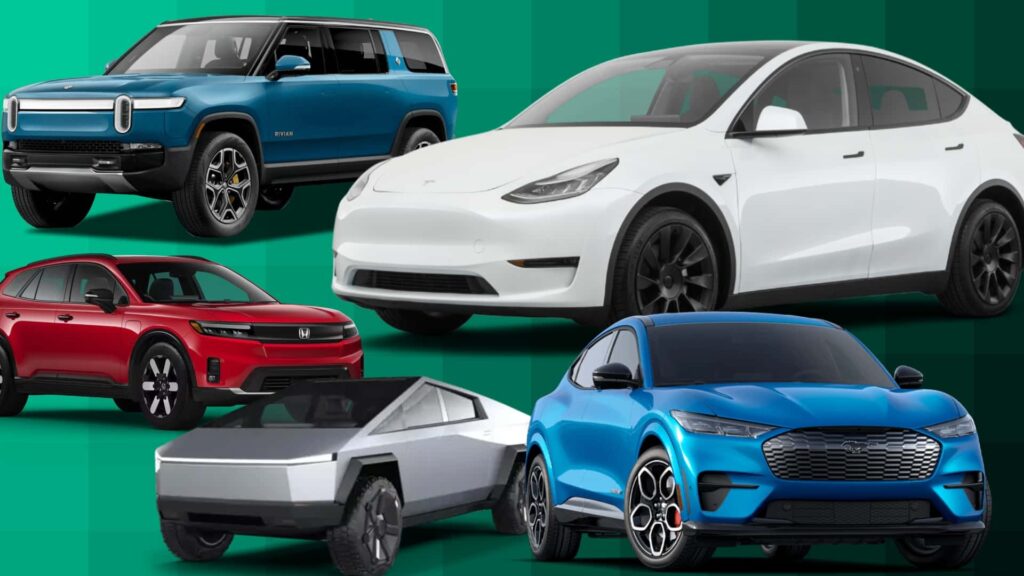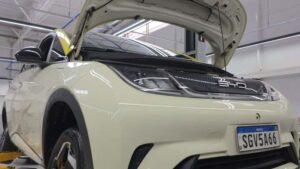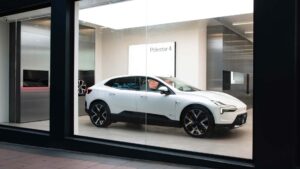
They called it a “sales slowdown” in 2024. And indeed, sales of all-electric vehicles haven’t taken off as quickly as the auto industry’s once-optimistic projections. But EVs still made up a record 8.1% of new-car purchases in the U.S. last year at 1.3 million units moved and sales are continuing to grow.
Not a bad year for the all-electric sector, when you look at the numbers. Those numbers come in from Cox Automotive’s Kelley Blue Book, which delivered its long-awaited annual U.S. sales report today.
As we noted previously, the fourth quarter of 2024 was an especially strong one for electric sales, driven in part by aggressive end-of-year lease and finance deals and fears that the new presidential administration could eliminate some or all of the EV tax credits. In the end, electric sales were up 7.3% annually, and that 8% electric market share was also up from 7.8% in 2023. So it was a good year of electric sales for many automakers—but certainly not all of them, Cox Automotive reports.
“The gains in 2024 were also supported by excellent new products, particularly from General Motors and Honda Motor Co., which together sold nearly 80,000 more EVs in 2024 than in 2023,” the report said. “Hyundai Motor Group and Ford Motor Company also notably increased EV sales last year.”
However, “By volume, Tesla sales were estimated to be lower year over year by more than 37,000 units (roughly the volume GM added). VW and Mercedes-Benz also posted significantly lower volumes in 2024 compared to 2023,” the report said.

Tesla Supercharger Network: Opening Up In North America
Indeed, Tesla has been losing market share for some time now. Blame increased competition, an aging lineup of vehicles or people being turned off by CEO Elon Musk, or some combination of those things, but as the EV sector grows the leadership of the company that kicked it all off was bound to shrink sooner or later. Fans haven’t warmed up to the styling and high costs of Mercedes-Benz’s EVs, and Volkswagen took a major hit with the ID.4 crossover halting sales for about three months.
But even with those tailwinds, Tesla kept its EV sales crown in 2024. Here are Cox Automotive’s top 10 best-selling electric models in the U.S. last year:
- Tesla Model Y
- Tesla Model 3
- Ford Mustang Mach-E
- Hyundai Ioniq 5
- Tesla Cybertruck
- Ford F-150 Lightning
- Honda Prologue
- Chevrolet Equinox
- Cadillac Lyriq
- Rivian R1S
There are a few things we can parse from these results, so let’s dig in.
The wins from the Model Y and Model 3 aren’t terribly surprising, given Tesla’s still class-leading charging network and the rapid-fire price cuts on the cars. It’s still hard to go wrong with either of them. What’s even more interesting is that the Mustang Mach-E kept its long-held third-place slot; the Mach-E has received several important updates and new trim levels as of late, and it remains among the first non-Tesla EVs to be able to use the ubiquitous Supercharger network. The Mach-E is also now the top-selling Mustang model of any kind.

Photo by: InsideEVs
2025 Hyundai Ioniq 5 Limited
The Ioniq 5 had an extremely strong year, leading the charge for Hyundai to become the no. 2 U.S. seller of EVs behind Tesla. (Third place went to GM and fourth went to Ford, if you’re curious.) With a native Tesla-style NACS plug from the factory and U.S. production allowing it to score whatever EV tax credits survive the Trump administration, it could have an even better year ahead.
While demand has indeed slowed for the Cybertruck, it still edged out the F-150 Lightning as America’s best-selling electric pickup truck; that’s no easy task. Still, the truck remains incredibly polarizing, and the fact that Tesla entered the truck market but still couldn’t eke out a year of sales gains is quite telling.
GM clearly had an excellent year of sales, but the Honda Prologue was the real surprise there; as we have written before, it’s proof that people want good EVs from this Japanese brand. (The intense lease and financing deals certainly helped as well.)

Photo by: InsideEVs
Finally, the Rivian R1S keeping its slot in the top 10 was another positive sign for the company, which saw sales rise nearly 4% in 2024 despite a parts issue halting new car production for longer than the automaker surely wanted.
But as CES proved last week with companies all over the world focused on batteries, software and autonomy, we’re likely in for another banner year for the growth of electrified cars—and Cox Automotive’s analysts agree. “In fact, in the year ahead, one out of every four vehicles sold will likely be electrified in some way—a hybrid, plug-in hybrid or pure EV,” the report said. “One thing is for certain: Each year, more electric vehicles with advanced battery technology are making their way onto America’s roads.”
Contact the author: patrick.george@insideevs.com



